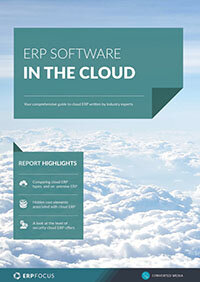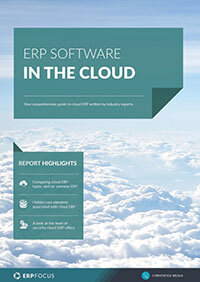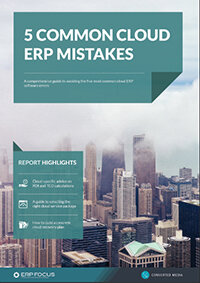Can Cloud ERP can boost the Italian economy?
When Italy’s economy transformed from agriculturally heavy to industrial after the world war, it was a promising sign that Italian businesses were pro-active toward changes. Around 15 years ago, with the technology boom, Italian businesses were among the earliest adopters. But rapid change digital change happened at such as fast pace that these businesses were left with the initial choices they made which hindered progress. A good example of this is ERP adoption. ERPs in the past were exclusive to bigger organizations with deep pockets. The process was to buy a license, use the software then after 5 - 7 years toss it away and purchase a new license. But, in the recent years, Cloud computing has put a mark on the IT industry and has served up offerings to enterprises of all sizes.
Learn more about Cloud ERP with our helpful guide to avoiding common Cloud ERP mistakes
What is a Cloud ERP and what makes it appealing to growing businesses and a changing market in Italy?
Cloud computing has been around since the early age of the Internet but more as a concept, representative of the future of technology. Now the most famous of ERP providers are promoting at the very least a version of their offering in the Cloud.
But what does it exactly mean? Simply put, Cloud ERP is when the ERP provider deploys the software in its own cloud infrastructure (physical data centers it manages) and gives end users access to use an instance of it by just a username and password and an internet browser.
The main characteristics of a Cloud ERP solution are as follows:
- Businesses don’t need to have a huge IT team to maintain their physical servers and in most cases, they won’t even need a single IT person.
- The software becomes highly accessible, meaning you can access it anytime, anywhere and at any place. In the past, the access to on-premise ERPs was limited by organizational barriers and was accessible only through VPN (virtual private network) connections.
- Businesses will pay as a service to the software provider, this means no fixed assets and eventually more positive numbers in the cash flow statement.
- The concept of Cloud computing and SaaS (Software as a Service) allows the vendors to regularly update their software and roll it out for the end user without additional costs which both benefits the vendors and the end users to stay relevant and change as the market changes.
What is in it for Italian market?
Italy’s market has been the front-runner in many ways and as they say “the first one through the wall always gets bloody”. Considering this, it might be fair to suggest Italian businesses are more resistant to capital investments that will eventually become obsolete.
Italian businesses have added to their balance sheet by purchasing, not only on-premise ERP solutions, but a handful of other software which means they’ve created a Frankenstein IT architecture with patches, customizations, and integrations. This means Italian businesses are more resistant to new IT investments.
Still, Italy has been among the top 10 in the world to invest in Cloud computing and this is a concrete signal that the market is about to change. In fact, many software vendors are now making a return in the Italian market.
Waves of change often come with huge wins and huge losses and the wise business people need to consider choosing the winning side.
Businesses will be adopting Cloud ERP much more than before, either because they have a well thought out plan or because it’s just trendy. They might succeed using it and grow their business or they might not be able to sustain the heavy burden of change. But one thing is clear, Cloud computing is here to stay and it will forever change the way we interact with software.
Free white paper

ERP Software in the Cloud
Get your free guide to cloud ERP software

Featured white papers
-

Five common cloud ERP mistakes
Get your comprehensive guide to avoiding the five most common cloud ERP errors
Download -

Related articles
-

Why you shouldn't underestimate cloud ERP consultant costs
Make sure to take the cost of a consultant into account when planning your cloud ERP budget
-

Secret KPI: Why Your ERP Implementation Team Matters More Than Software
Learn how Godlan ensures successful ERP implementation for manufacturers with proven strategies &...
-

Cloud ERP vs on-premise ERP: an objective comparison
Are you choosing between cloud ERP and on-premise ERP? This balanced guide will help

